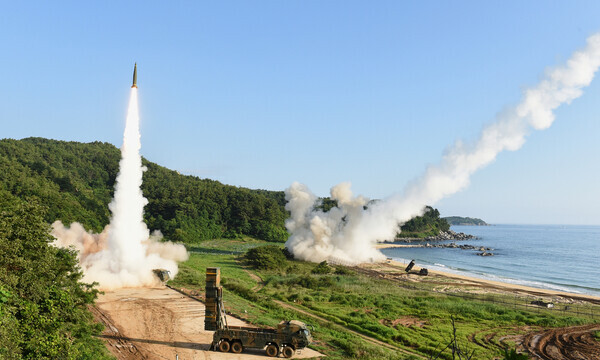hankyoreh
Links to other country sites 다른 나라 사이트 링크
Tensions on Korean Peninsula raise questions about Yoon’s N. Korea policy

North Korea’s test launch of an intercontinental ballistic missile (ICBM) on Thursday has focused attention on what South Korean President-elect Yoon Suk-yeol’s policy toward the North will be.
Just one day before the launch, the presidential transition committee had emphasized that the new administration would not adopt a hardline policy toward North Korea. But since the North’s ICBM launch crosses a “red line,” Yoon is expected to gravitate toward a policy of pressuring Pyongyang.
Soon after North Korea’s ICBM launch Thursday, the presidential transition committee released a position statement describing the launch as a “provocation.”
In the statement, the committee said it “strongly condemns [. . .] a grave provocation that breaks the moratorium [on nuclear weapon tests and ICBM test launches] that North Korea pledged in 2018 and that threatens our security by fully violating UN Security Council resolutions.”
“We must respond strongly to North Korea’s provocation by working with the international community through close collaboration with the US. We call on the UN Security Council to swiftly convoke an emergency meeting and take action while sharply condemning the North’s provocation,” the committee also said.
“President Moon Jae-in needs to explore stern political, diplomatic and military options that can be taken against the North Korean threat so that he can keep the public safe,” the committee added in its statement.
Previously, Yoon has emphasized responding strongly to North Korean provocations. But he has not released a separate statement in response to the ICBM launch — apparently because he decided it would not be appropriate for the president-elect to send a message to North Korea while Moon is still exercising his authority as commander-in-chief.
“Sending a message [to North Korea] while someone else is president would carry the risk of creating confusion or misunderstanding,” an official at the transition committee told the Hankyoreh over the phone.
But Yoon’s camp has concluded that the confrontation between the two sides is bound to escalate. In particular, analysts say the transition committee’s description of the missile launch as a “provocation” was intended to distinguish Yoon from the Moon administration.
The Moon administration has avoided using the term “provocation” since Kim Yo-jong, younger sister of Kim Jong-un, sharply objected to the “double standard” of only referring to North Korean missile launches as “provocations” in September 2021.
The term “provocation” did not appear in the summary of the emergency meeting of the National Security Council over which Moon presided on Thursday.
Yoon is likely to also take a markedly different tack from the Moon administration on North Korea policy in the future. In his campaign, Yoon pledged to be principled and consistent in his denuclearization talks with Pyongyang. That stance is unlikely to change, given that Kim Tae-hyo, a foreign policy advisor for former President Lee Myung-bak and a strong advocate of “principles” in North Korea policy, is playing a major role on Yoon’s transition committee as a member of the foreign policy and national security subcommittee.
Kim was the architect of Lee’s signature North Korea initiative, which was known as “Vision 3000: Denuclearization and Openness.” Under that initiative, the Lee administration promised to give North Korea enough economic aid to bring its per capita national income to US$3,000, provided that the North moved down the path of ending its nuclear program and opening up.
By Seo Young-ji and Oh Yeon-seo, staff reporters
Please direct questions or comments to [english@hani.co.kr]

Editorial・opinion
![[Column] Season 2 of special prosecutor probe may be coming to Korea soon [Column] Season 2 of special prosecutor probe may be coming to Korea soon](https://flexible.img.hani.co.kr/flexible/normal/500/300/imgdb/original/2024/0426/3317141030699447.jpg) [Column] Season 2 of special prosecutor probe may be coming to Korea soon
[Column] Season 2 of special prosecutor probe may be coming to Korea soon![[Column] Park Geun-hye déjà vu in Yoon Suk-yeol [Column] Park Geun-hye déjà vu in Yoon Suk-yeol](https://flexible.img.hani.co.kr/flexible/normal/500/300/imgdb/original/2024/0424/651713945113788.jpg) [Column] Park Geun-hye déjà vu in Yoon Suk-yeol
[Column] Park Geun-hye déjà vu in Yoon Suk-yeol- [Editorial] New weight of N. Korea’s nuclear threats makes dialogue all the more urgent
- [Guest essay] The real reason Korea’s new right wants to dub Rhee a founding father
- [Column] ‘Choson’: Is it time we start referring to N. Korea in its own terms?
- [Editorial] Japan’s rewriting of history with Korea has gone too far
- [Column] The president’s questionable capacity for dialogue
- [Column] Are chaebol firms just pizza pies for families to divvy up as they please?
- [Column] Has Korea, too, crossed the Rubicon on China?
- [Correspondent’s column] In Japan’s alliance with US, echoes of its past alliances with UK
Most viewed articles
- 1‘We must say no’: Seoul defense chief on Korean, USFK involvement in hypothetical Taiwan crisis
- 2After election rout, Yoon’s left with 3 choices for dealing with the opposition
- 3Why Kim Jong-un is scrapping the term ‘Day of the Sun’ and toning down fanfare for predecessors
- 4Noting shared ‘values,’ Korea hints at passport-free travel with Japan
- 5AI is catching up with humans at a ‘shocking’ rate
- 6[Editorial] Korea’s surprise Q1 growth requires objective assessment, not blind fanfare
- 7Two factors that’ll decide if Korea’s economy keeps on its upward trend
- 8Yoon says collective action by doctors ‘shakes foundations of liberty and rule of law’
- 9Amnesty notes ‘erosion’ of freedom of expression in Korea in annual human rights report
- 10South Korea a veritable tax break paradise for chaebol